COVID-19: Collective Experiences During a Global Pandemic (Volume 1)
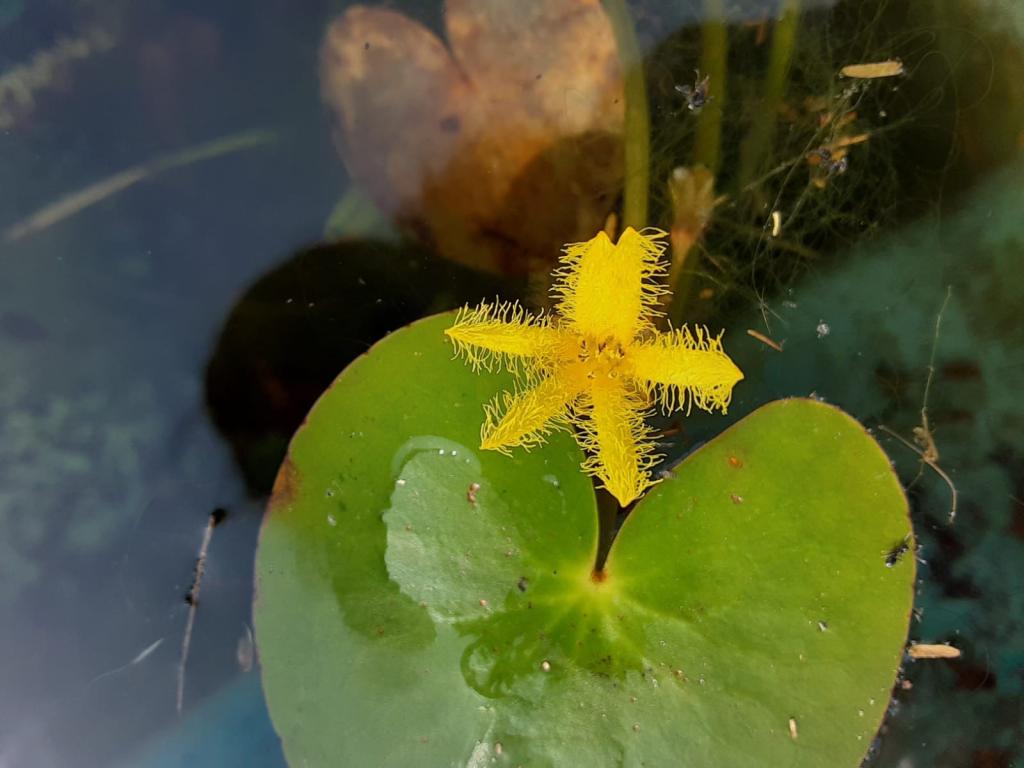
Editorial Note: COVID-19 has disrupted our lives and we want to share our experiences of the pandemic through a series of snapshots. We have been inspired by two models we have seen used in the New York Times for creative ways to tell brief but highly specific and individualised stories about our experiences — Tiny Stories and Number Stories.
Taxi to a Potential Future
‘Caaaaaaape TOWN’ – it took a few moments to realise that the ‘slam door’s’ call encouraging customers to hurry to the main road and catch the taxi had been infrequent during lockdown. The call pulled my attention away from often infuriating skills I had to acquire to manifest emergency remote teaching quickly, complete with inequities. I imagined present inequities and inequalities hopping into a giant, overpriced gas-guzzler and bursting into flames in the centre of the sun. Meanwhile equity and equality boarded the taxi, masks in place, and inclined their heads to solidarity, restitution, and compassion, already seated inside. – Carla Tsampiras
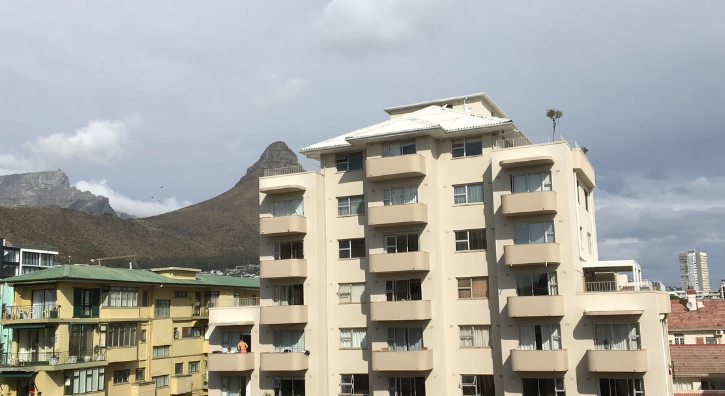
Carla Tsampiras is a Senior Lecturer in Medical and Health Humanities, UCT, South Africa. Carla is sticking to a full lockdown while outside it is technically a slightly eased level-4 lockdown with curfew.
Sheltered from the Disruption of Lockdown
I've worked online at home for over two years now, as has my husband, so when a six week lockdown came into effect in Portugal not much changed for us. We normally have contact with 5-10 people a week so we're fairly socially isolated at the best of times. Without kids to take care of we could also get up later, stay up later, have long videocalls with friends in South Africa and tune-in for livestream safaris at 6am. I felt fortunate to have online work and doubly fortunate to live in a rural area. Every few days I check the ministry of health website and watch the little blue dots of COVID19 cases slowly expand eastwards towards us, but still no confirmed in our conselho (municipality). With the average age in our village being 75, following the rules of lockdown was a vow of solidarity towards our elderly neighbours. Last week the state of emergency ended and a state of calamity was declared. Calamity! Hard to believe that's better than emergency, but it is. A de-confinement plan is in place and slowly, slowly things are opening up again. – Megan Wainwright
Megan Wainwright is a Qualitative Research Consultant based in rural Portugal and an Honorary Research Fellow in the Department of Anthropology at Durham University. She was a Postdoc in the Division of Social and Behavioural Sciences, UCT from 2014-2017.
Masks for the Occasional Grocery Shopping Trip, Morning Walks and Some Sort of Emergency
So far, I’ve managed to get 3 face masks. If anyone would have said that in 2020 masks would be trending in South Africa and you wouldn’t be able to go anywhere without one on, I doubt I would’ve believed them. I remember in 2018 when Hello Kitty face masks were a big thing in Hong Kong pop culture and now just two years later the world is following suit. It’s somewhat surreal living in a time when you cross paths with different people and you can’t smile as a way to greet, but its profound to see everyone wearing a mask. Knowing that people are willing to make the slightest change in their daily behaviour by wearing a mask so that they protect themselves and others from the spread of COVID-19. – Ruvimbo Chigwanda

Ruvimbo Chigwanda is the Research Administrator and MPH student in the Division of Social and Behavioural Sciences, UCT, South Africa currently in lockdown level 4.
There Goes Another
‘There goes another, no mask, and only one item of shopping!’ he cried, turning to his partner, desperately seeking her approval of his outrage.
This morning hunt for lockdown miscreants from this coffee mug-wielding privileged man, standing on his privileged balcony in his privileged suburb, had got out of control. He’d realised this when he began to regret not owning a catapult. He consequently adjusted his behaviour, with the wise guidance of his partner, and now sits with his coffee and focuses on the activities of clouds and birds, and the vast majority of those who are adhering to the lockdown. The lesson here for this man is that the defiance of the lockdown he witnesses is not about the pandemic at all. It is about privilege, because for some who inhabit this lucky state, privilege does, what privilege wants. – Neil Overy
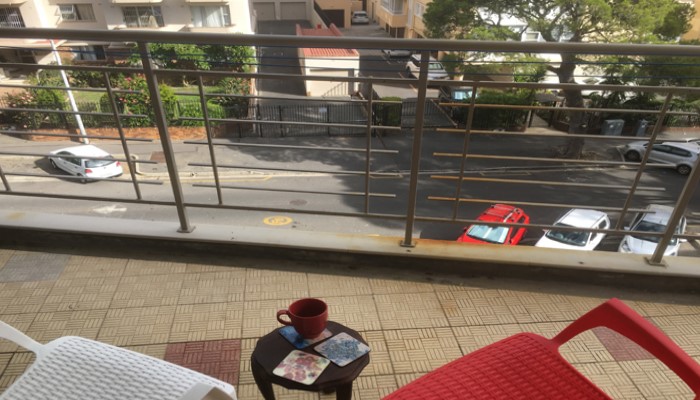
Short walk to Woolworths
Neil Overy is a Research Associate in Environmental Humanities South, UCT, South Africa. Neil lives in Sea Point, level 4 lockdown, not sure if this qualifies as a full lockdown?
Repetition
56 days since lockdown began
186 years since this piece was composed
4,328 notes (I counted)
10 fingers
1 brain, trying to keep up
0 piano teachers working during lockdown
30 minutes most days
913 times played (badly) so far
7 mistakes that won’t go away
12 YouTube videos watched
8 times interrupted by the cat walking on the keyboard
76 swearwords uttered
40,000 years (approx) until I will really be able to play this
17 collisions between head and piano
127 frustration biscuits consumed
4 smiles for increments of progress made
- Sanj Karat
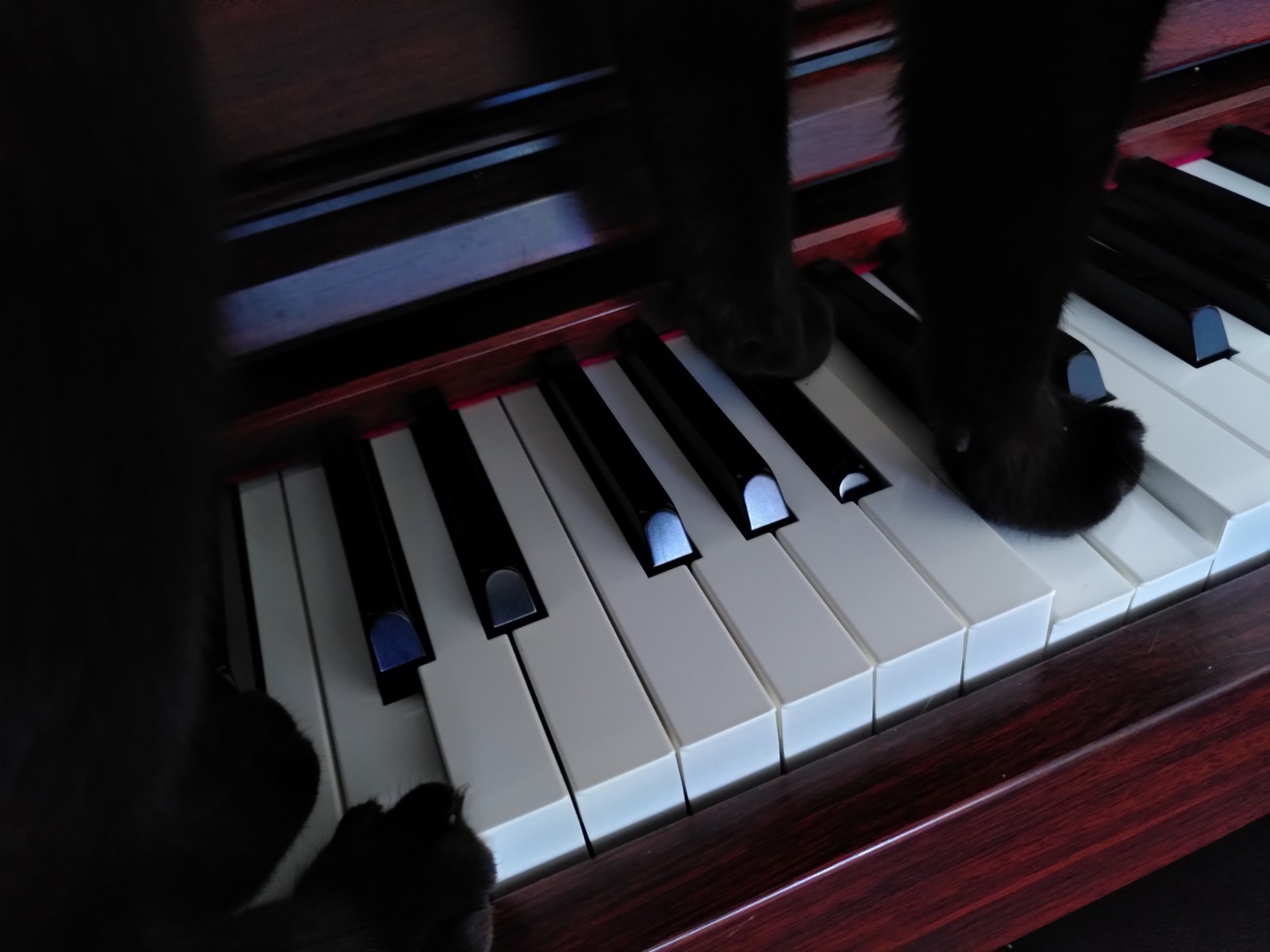
The composer in residence
Sanj Karat is a Research Fellow at the London School of Hygiene & Tropical Medicine and at Queen Margaret University, Edinburgh. He is currently based in South Cumbria, in the UK. Lockdown started on 23 March and started to ease in mid-May..
Beating COVID-19: Education is Key
COVID-19 came as a complete shock. It is new to everyone so naturally, my family and I have been scared and worried. We have two small children who attend primary school so my wife and I have started educating them about this virus; telling them that they cannot go out to play with friends, go to school or attend church. Instead, we have used the family time we are spending together to share the knowledge we have on the virus and help them adjust to the 'new normal'.
My experience of being part of the Movement for Change and Social Justice (MCSJ) which is based in Gugulethu and Khayelitsha, has been largely marked by going out to the communities and educating. MCSJ has been working with the Department of Health, sharing information as widely as we can in our communities, and raising awareness. We are distributing posters to conscientise about the Corona Virus. The Men’s Forum (part of MCSJ), have been handing out lunch to people who are scant for food at home, and assisting to educate patients at the Gugulethu Day Hospital. I think what is key, is education about the virus, so we all know what to do to flatten to curve. All this is especially important, in areas where people may not have access to information about the virus or even understand that information. We need to see to the conscientisation of our communities. – Isaac Mangwana
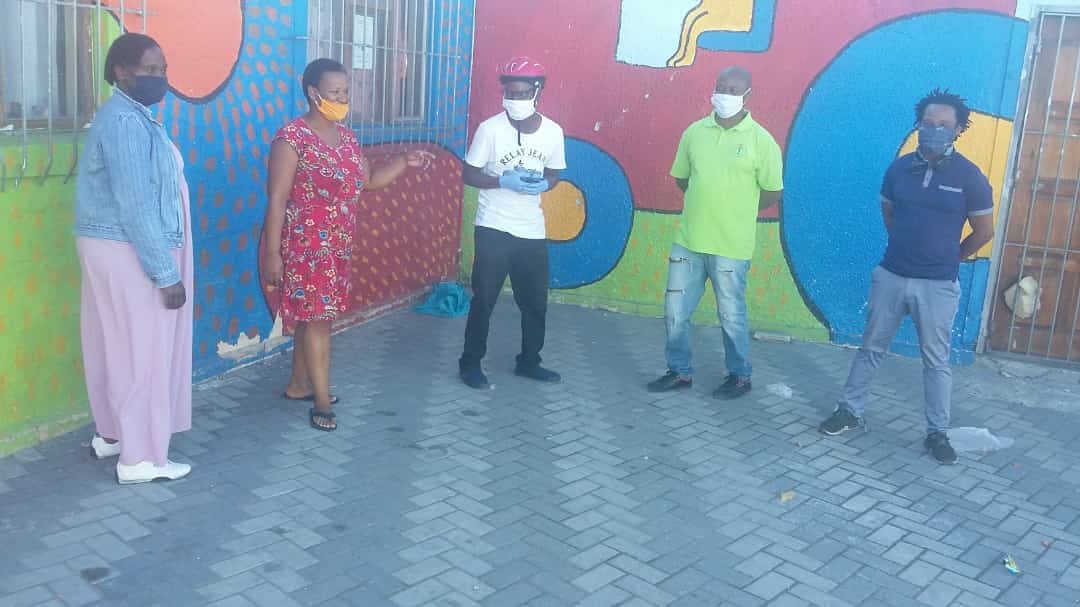
MCSJ doing an outreach campaign in Gugulethu
Isaac Mangwana is the Men's Forum Coordinator for the Movement for Change and Social Justice (MCSJ), currently in lockdown level 4 in Gugulethu, South Africa.
The Eleventh Hour
For all South Africans, 26 March 2020 is a day to remember, the day we entered a three-week lockdown that was extended and is, to a certain extent, still going on. It was also one of the most chaotic days of my life, as my husband and I moved into our forever home. Five hours before being ‘locked-up’, we parked the car on the driveway of our house with a seven-month-old son and our cat Snowball in the backseat. We had frantically packed our belongings in two evenings, whilst baby slept in the corridor and literally swept ourselves out of the door so the new tenants could move in. Exhausted, confused and dirty we fell asleep that first night of the lockdown. We never knew we would not leave the house for anything besides groceries for the next 50 days, but could not be happier, we moved into the best ‘prison’ in the world, our own dreamhouse. – Myrna van Pinxteren
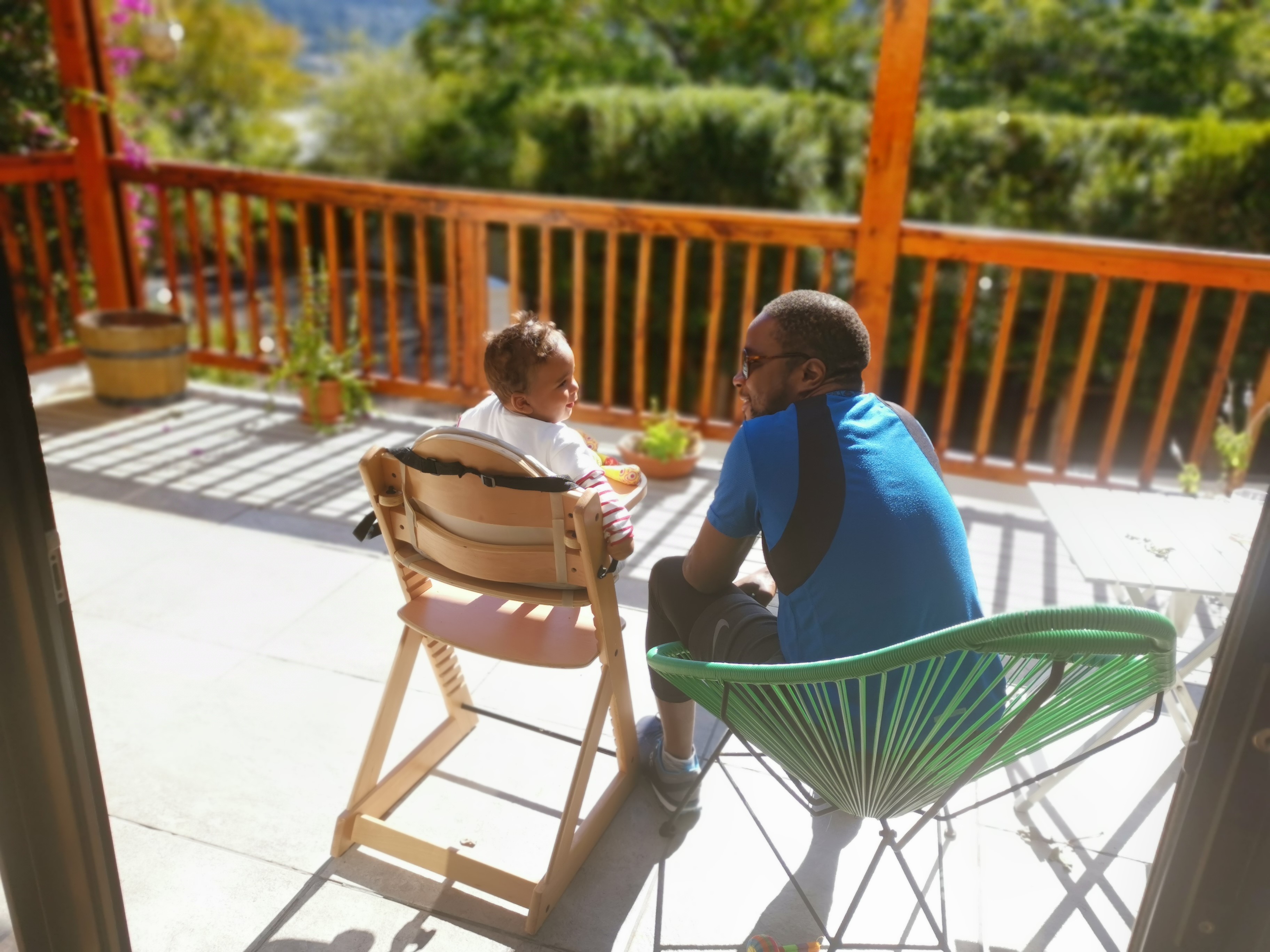
Dad and son spending quality time together
Myrna van Pinxteren is a Research Co-ordinator and PhD candidate in iALARM Project in the Division of Social and Behavioural Sciences, UCT. Her work focuses on communication and information sharing within community settings. Myrna lives with her family in Hout Bay, South Africa, currently in lockdown level 4.
COVID-19: An Eye Opener
I have found this pandemic and national disaster a true eye opener to the socio-economic illnesses crippling our country which have been exacerbated by COVID-19. I have seen how nonchalant some parents have approached the lockdown measures put into place by our government; in every street in Gugulethu you will find children playing around as if there has been no alteration to the norm, as if it is just school holidays. However, I am not placing any blame on the parents, I understand that it could also be a lack of education on their part. We need parental skills workshops, to equip them with the necessary skills to look after themselves and their children. If you do not have a true understanding of the virus you cannot look after yourself, and consequently, adequately look after your children.
I have also seen a strong sense of cohesiveness, communities are sharing, loving and giving thanks to one another. There is a strong sense of togetherness, an unbreakable spirit to endure this difficult time we are faced with together as one. I have also seen that this sense of togetherness is embodied in the ethos that South Africa as a country has been standing upon; that we can get through this together, if we anchor one another till we see a brighter day. COVID-19 has been my eye opener for 2020. – Lee Khabele
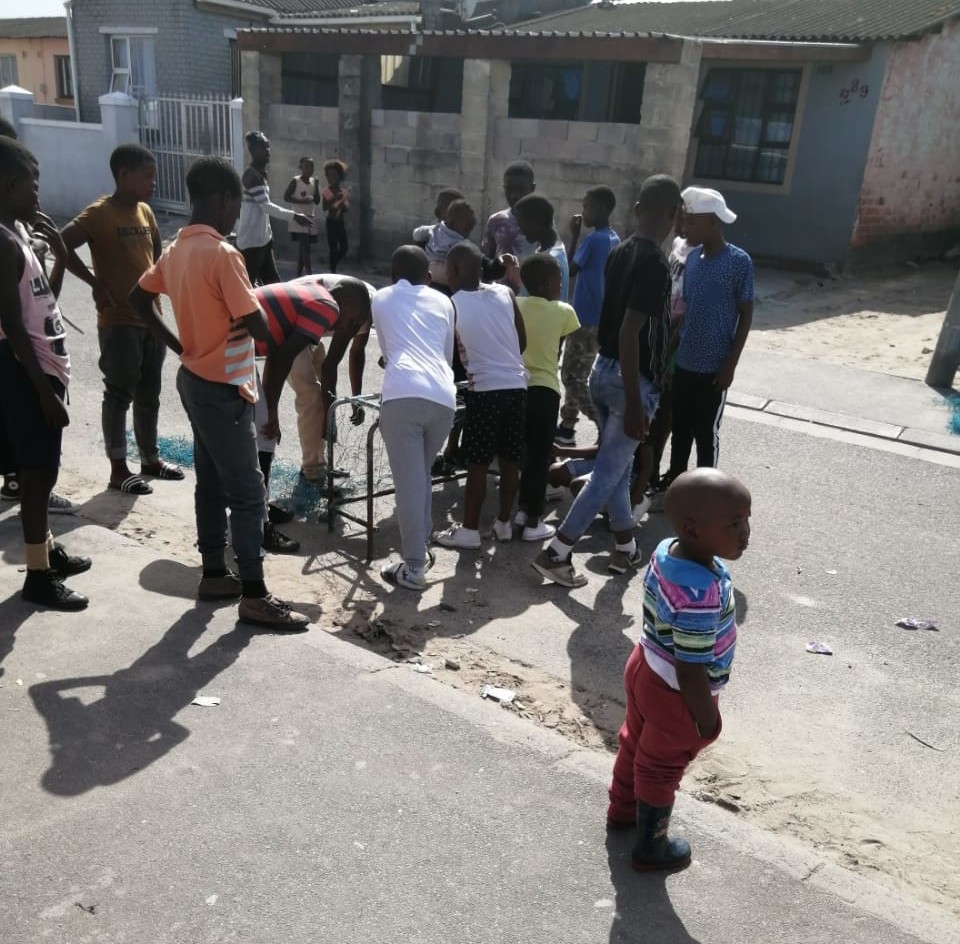
Restless children playing in the streets, Guglethu
Lee Khabele is the chairperson of the Gugulethu Development Forum (GPDF), a civil society organisation purposed to serve the socio-economic needs of the local community. He is currently in lockdown level 4 in Gugulethu,South Africa.
(Dis)connections
Transitions are slippery things, difficult to pin down with words. In March 2020 I moved very quickly back to Canada (my home country) after almost a decade in Southern Africa. My PhD graduation ceremony was scheduled for the following week. Below are some numbered reflections (in no particular order) of (dis)connections during this time:
One tweet by the Canadian minister of Foreign Affairs suggesting that Canadians return to home while it is still possible:

Two days to pack up and move countries
Three suitcases
Four weeks in self-isolation
Five family members at a makeshift distance PhD graduation (see picture below)
Six hours, the time difference between Toronto and South Africa
Ten days to get an (indeterminate) COVID-19 test result
Fifteen, average number of weekly zoom meetings
Twenty-four family online card games
Thirty-one shared meals with my sister and her family in my new (temporary) home
Fifty-seven adolescent advisors that we will be conducting remote participatory research with in South Africa and Kenya
Sixty-three days of adjusting to a new reality and missing South Africa
Ninety the decibel volume of my nephew’s (happy/chatty/hungry) screams
100% the feeling of being close to my family
- Lesley Gittings

My ‘graduation ceremony’ with my parents and sister’s family at-a-distance.
Lesley Gittings is a postdoctoral researcher with the University of Toronto and the Accelerate Hub at UCT, where she conducts participatory research with adolescents and young people. She completed her PhD in the Division of Social and Behavioural Sciences, UCT and was a SASH fellow. Canada is not under lock-down, but travel quarantine is required, alongside social distancing for members of different households.
'No Timing' - Relocation to COVID-19
If ‘no timing’ was a person, it would definitely be me. At the beginning of March 2020, I left my family in Limpopo to complete my PhD in Cape Town. No sooner had I arrived when, boom! LOCK-DOWN started. I am separated from loved ones with no possibility of seeing them soon. COVID-19 revealed how dependent I am on the outside world, its people and the roles they play in my daily life. I love entertaining and was looking forward to connecting with my Cape-based friends. With minimal distractions from the outside world, I am forced to look inward and relate with myself in ways I did not previously imagine. It has been rough. Some days are better than others, but WOW! The lessons have been too real. – Tebogo Mokganyetji
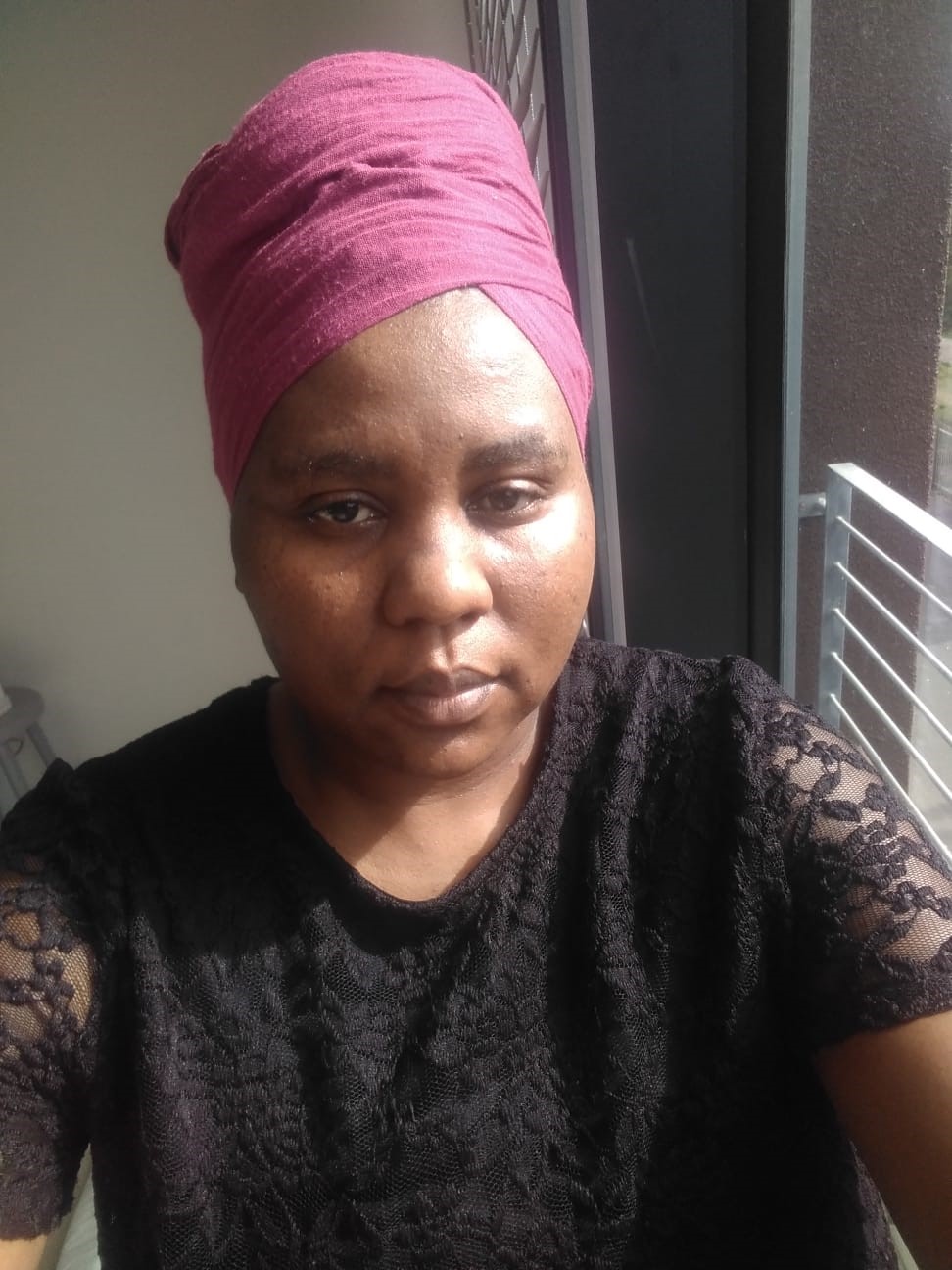
Alone in Lockdown
Tebogo Mokganyetji is a PhD Fellow with Division of Social and Behavioural Sciences, UCT, South Africa. She is currently on lock-down level 4 with curfew.
Small Things
I have found myself thinking about scale: from the microscopic virus, to its global, pandemic reach; from the proximity of bodies in township spaces, to the expansive homes and gardens in wealthy suburbia. My thoughts and feelings have also found a new scale, from the lightness and joy produced by the smallest things (watching a plant come into bloom, rediscovering Liquorice Allsorts or finding humour in what the dog ate that morning), to the disappointment and brow-furrowing frustration at equally small things (the favourite jersey left in Providence, the bathroom light left on or the failure to find humour in gathering the far flung remnants of what the dog ate that morning). While I travel between these worlds of feeling, at this time when uncertainty feels expansive, I commit to keep growing gratitude. – Alison Swartz
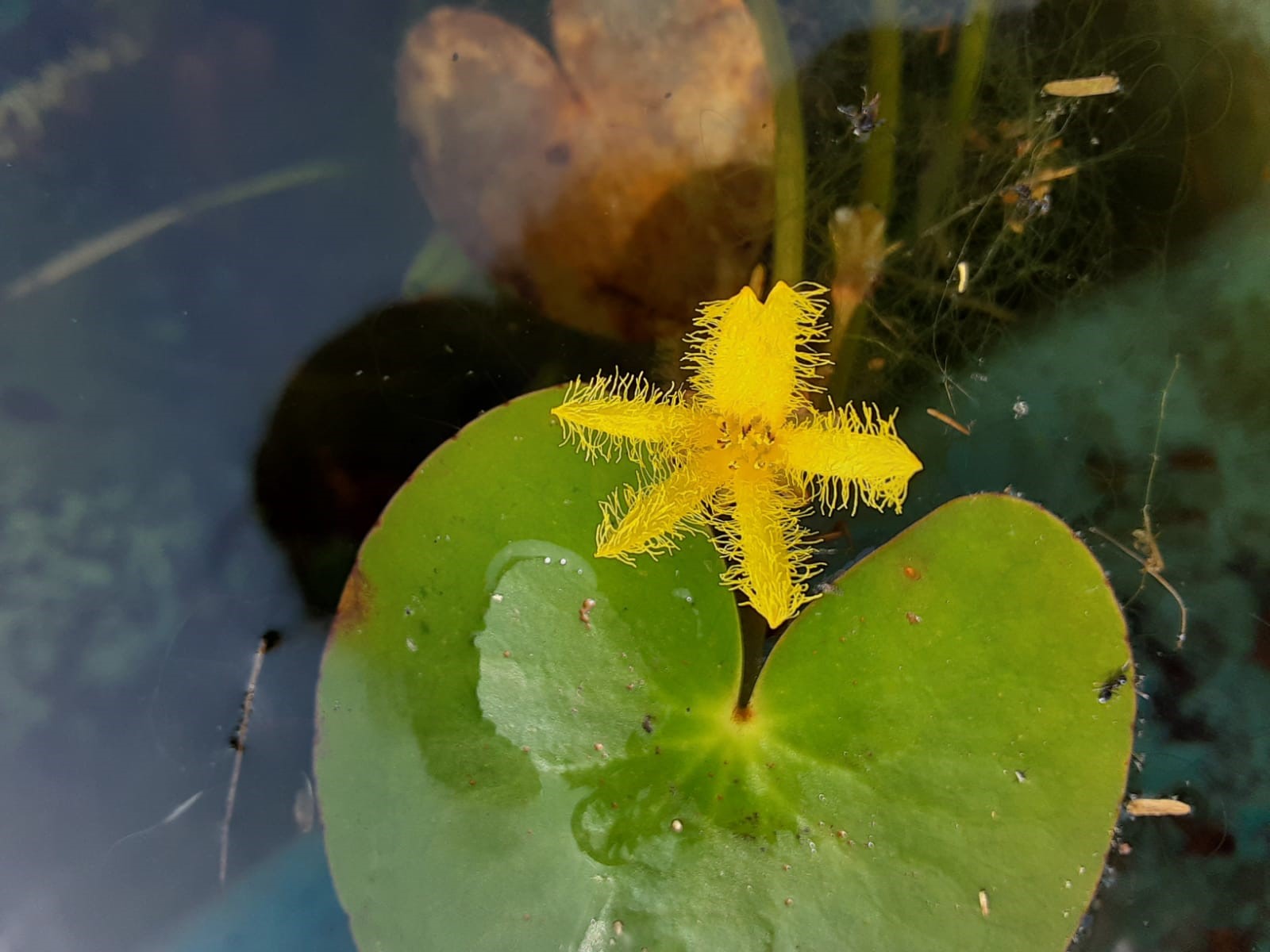
Tiny flowers in the eco pool
Alison Swartz is a Senior Lecturer in the Division of Social and Behavioural Sciences, UCT, South Africa currently locked down with her mother, partner and menagerie of pets in Rondebosch.
Serenity in the Storm
An opening in the clouds perfectly framed a view of the mountains one morning. It was an otherwise grey morning, our seventh one with outdoor privileges. That view – a window into both our former lives spent in the mountains and our present one gazing at them – offered a feeling of awe. That’s the feeling I attempt to cultivate each day. It’s not always successful, but today I feel blessed for the two friends who took me into their home, for the two cats each with their own personalities – one sweet, one a bit salty – and the one dog who sleeps with his legs in the air against the wall. I don’t often think of myself as a foreigner in this country I’ve called home for the past five years and this time could have easily sent me ‘home’. But I’m here and I’m grateful. – Miriam Hartmann
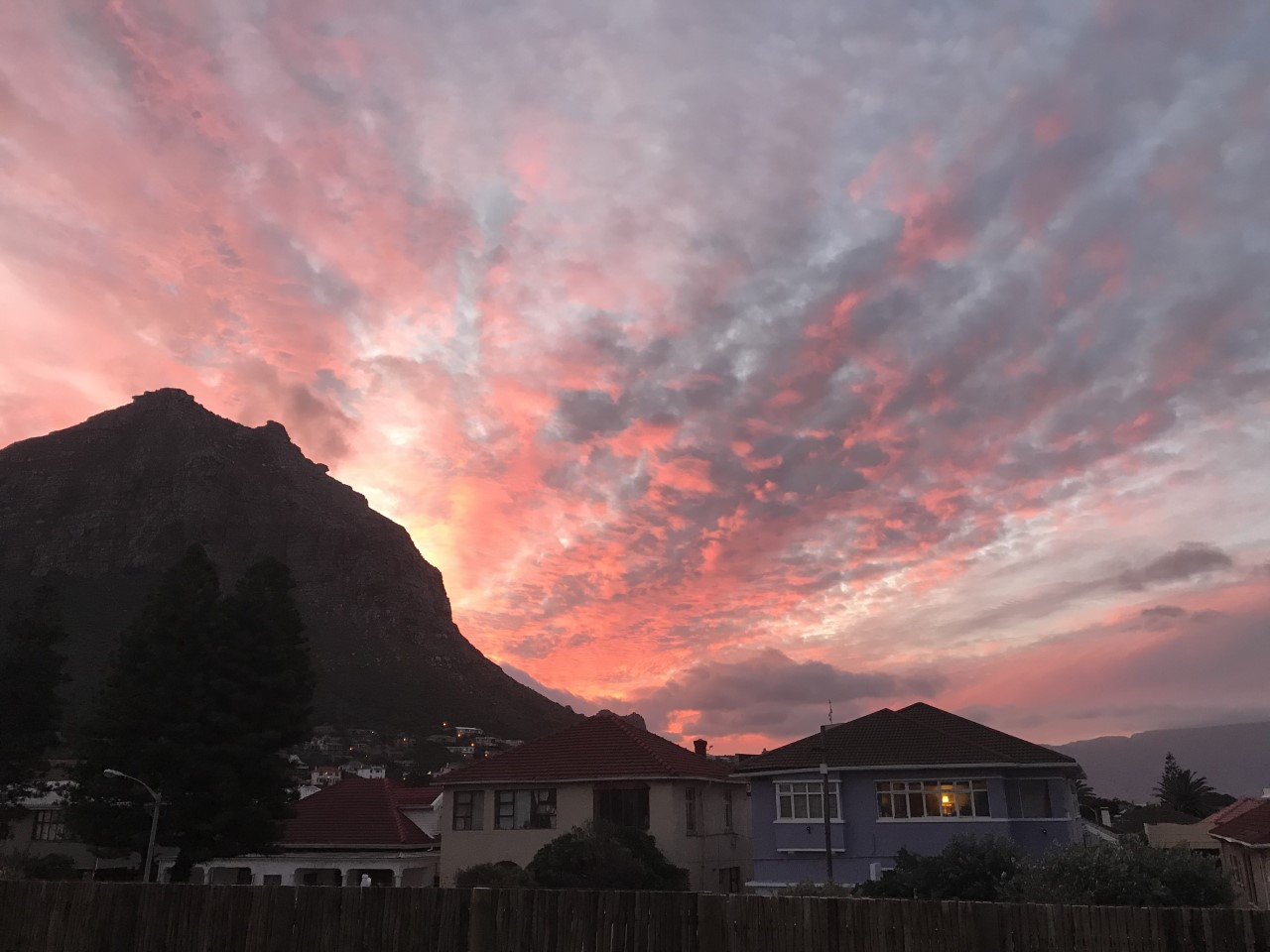
Muizenberg sunset
Miriam Hartmann is a Public Health Researcher residing in Muizenberg, Cape Town where she takes comfort in the seaside air during the COVID-19 Lockdown. Miriam is also an associate of the BRIDGES Program, Division of Social and Behavioural Sciences, UCT, South Africa.
Big and Little Emotions
Each day is a new day that looks eerily like the day before. The emotions, however, come in intensive waves, colouring each one of those days in a different way. The emotions come both big and small. I have worried about the safety of my best friend who is 7 months pregnant working in a nursing home dealing with a COVID outbreak, but I have also worried about whether my dog ate the grape that rolled off my son’s snack plate. I have experienced the soul filling joy of seeing my son sing ‘Mr. Sun’ with 6 other 3-year-olds through Zoom complete with imaginary saxophone playing, and the small joy of putting the last piece into a 1,000-piece puzzle. I have felt the frustration of trying to give a 2.5-hour lecture to master’s students with a toddler trying to “help” but also the small frustration of not being able to find large pasta shells (or really any shape other than spaghetti) at the supermarket. I have felt the immense pride of my husband taking care of patients in a temporary COVID-19 ICU and also the pride of my 3-year-olds’ drawing of Mr. Salt from Blue’s Clues. – Jennifer Pellowski
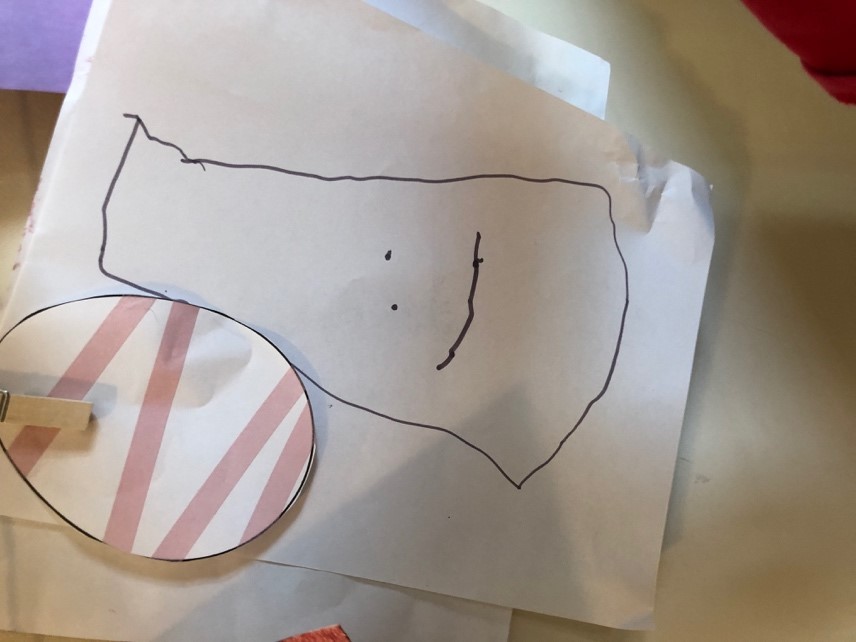
"Mr Salt" by Hunter, Age 3
Jennifer Pellowski, PhD, an Assistant Professor at Brown University currently in full lockdown in Connecticut, USA with her husband (a critical care flight nurse), 3-year-old son, and rescue dog.
Hunger
Narratives of fear and anxiety pervade as the world shifts into – ‘fight response’ due to COVID-19. There have been so many changes, yet some challenges our people face still linger in my mind, hunger being poignant:
Before the pandemic, I was scared for our people
I was scared for the child, wondering why their mother’s tears became the rain
I was scared for the mother, staring at breadcrumbs disintegrating between her fingers
I was scared for the father, running in circles – waiting
During the pandemic, I am still scared for our people
I am scared for the child, wondering why their mother’s tears became the rain
I am scared for the mother, staring at breadcrumbs disintegrating between her fingers
I am scared for the father, running in circles – waiting
- Carmen Späth
Carmen Späth is a concerned Postdoctoral Research Fellow in the Division of Social and Behavioural Sciences, UCT, South Africa. At present, Carmen is experiencing lockdown level 4.
As we move through the different of stages of lockdown both in South Africa and around the world and navigate our way through this pandemic, we will be adding stories about our experiences. Watch this space for more stories!